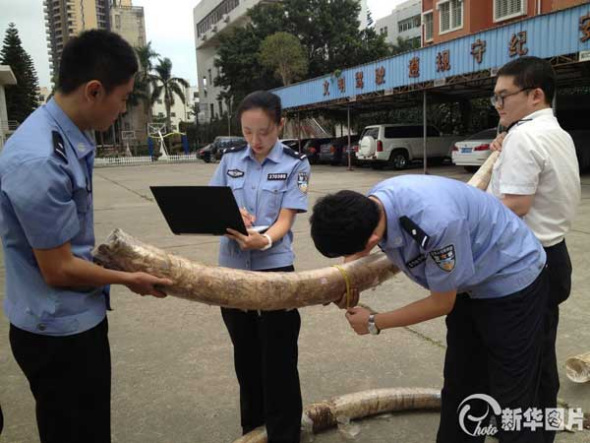

Smuggled ivories confiscated in Xiamen (Photo: news.cn)
China hopes that countries can improve coordination, do less finger-pointing and make more joint efforts in fighting ivory smuggling globally and conserving elephant populations, a Chinese official has said.
In a recent interview with Xinhua, Meng Xianlin, deputy director of China's Endangered Species Import and Export Management Office, said the increase of ivory poaching in Africa was caused by several factors, such as conflicts between elephants and humans in the animals' habitats, local people's livelihoods, warfare and organized crime.
"We can't simply attribute that to legal utilization and trade of ivory or to market demand," he said.
China's success in combating illegal ivory trade became apparent early this week, when the police department under the State Forestry Administration announced on Thursday that it had investigated 60 ivory-smuggling cases so far this year, arresting over 100 suspects and seizing more than 1,000 kg of ivory.
However, according to a report released early this year by the Convention on International Trade in Endangered Species (CITES), ivory smuggling activities have become more rampant globally since 2009 and more than 10,000 African elephants have been illegally killed each year.
In Meng's view, the fundamental solution to this problem must come from close cooperation among countries that hold elephant habitats, are transit points for shipments or are big consumers of ivory.
In elephant-habitat countries, efforts should be made on conservation, improving local people's livelihood and enhancing market management. The international community should provide technological and financial support to these countries in this regard, he urged.
At the same time, the countries concerned should cooperate at all ends of the smuggling chain and track ivory, strengthen law enforcement and crack down on organized crime, so as to break up the smuggling chain, according to the Chinese official.
Meng said the Chinese government was very serious in elephant conservation and has been actively pushing forward international cooperation and exchange.
China has set up a dedicated fund to provide financial support for elephant conservation programs initiated by African nations and international organizations each year.
It has participated in international special operations against ivory smuggling several times, and also sponsored international seminars on illicit ivory trade, Meng noted.
He also said that China, which has been making prestigious products from elephant ivory for almost 5,000 years, has taken most stringent regulatory measures on ivory trade.
China does not ban domestic ivory trade, but it sets a ceiling for the amount of legal market consumption at five tonnes each year.
Meng said raw elephant ivory and its products should be processed at designated places, sold at fixed shops and tracked on an individual item basis in China. The authorities have registered one by one all ivory tusks from legally-managed sources. Each ivory product is tracked through a unique photo ID and recorded in a database.
According to the official, China currently has 37 registered ivory-processing companies and 145 registered ivory trading companies. A review of these companies is done every other year.
Meanwhile, Meng said, imports and exports of raw ivory and its products are strictly regulated and monitored in China. All imports and exports should be approved by the State Forestry Administration and be permitted by Meng's office.
According to the CITES, African elephant ivory and ivory products enjoy top-level protection. China joined the convention in 1981.
Meng said the ivory that is allowed for trade in China came from two sources -- those that were imported before China joined the CITES and the 62 tonnes of raw ivory stocks which China bought from four African countries in 2008, as permitted by the CITES.
All other elephant tusks circulated in the Chinese market are labeled illegal.
Chinese laws stipulate that anyone who participates in illegal business and trade in elephant ivory is liable to punishments ranging from six months' imprisonment to a life sentence.
Meng also said the Chinese authorities and law enforcement have been vigorously cracking down on illegal activities involving the elephant ivory. An inter-department CITES law enforcement group, involving customs, public security, forest and quarantine personnel has been set up for this end.
Copyright ©1999-2018
Chinanews.com. All rights reserved.
Reproduction in whole or in part without permission is prohibited.